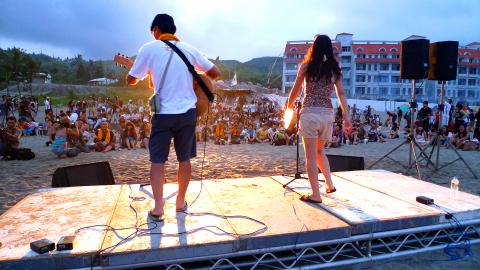Taipei’s oldest rock club, Underworld, closed its rusty metal gate for the last time last Sunday just after midnight to avoid steep government fines. Several hundred people lingered outside in the nearby park for hours longer as part-owner Ho Tung-hung (何東洪) thanked the staff, DJs and others who had helped keep the club running for 16 years. Ho, a professor at Fujen Catholic University, has now expanded the club’s fight towards the creation of a bulletproof legal status for live houses in all of Taiwan. In press conferences and editorials, Ho and other supporters have made repeated calls for Minister of Culture Lung Ying-tai (龍應台) to orchestrate a legal solution. So far, she has responded only through short press releases, expressing vague sympathies but promising no action. So Underworld supporters continue to organize, hold meetings and make creative Facebook posts. There are currently no plans to relocate or re-open.
Meanwhile, a protest concert is brewing in Taitung over a different controversy. The Fudafudak Concert — named after an expletive in the Amis language — will pit a group of Taiwan’s best singers, aboriginal rights activists and environmentalists against the local government and a hideous hotel construction scheme. Alas, it seems Live Wire is becoming a column about musicians against corrupt property developers. Well, here are the details.
Fudafudak will be held on Shanyuan Beach (杉原沙灘) next Saturday, July 28, though all are invited to come camp on the beach from July 21 to 29. In addition to being on one of the area’s prettiest, yellow-sand beaches, the event also draws from Taiwan’s most concentrated pool of aboriginal musicians, several of whom are famous recording artists who live in the area. The female singer Ilid Kaolo (以莉.高露), who used to perform under the name Hsiao Mei (小美), was awarded the Best New Singer in the most recent Golden Melody Awards. And just to be clear, her award was not for Best Aboriginal Singer (though she won that too), it was for best new singer, period. She’ll join a lineup of aboriginal-folk all-stars that includes Panai (巴奈), Kimbo Hu (胡德夫), Takanow (達卡鬧) and Long Ge (龍哥) as well as some very fun Taipei bands like Relax One (輕鬆玩) and the polymath, multicultural rap group Kao Chou Ching (拷秋勤). There will be about 20 acts in all. This will also be an extremely unique chance to see aboriginal musicians playing outdoors, in front of a sizable home crowd and on ground that they consider sacred. Last year’s first Fudafudak drew around 1,000 people, according to the organizer’s estimates. Given the huge aboriginal population in the area, this concert could achieve ritual-type dimensions. And no one would be surprised if singing broke out among the setup crew every night of the week. Best of all, it’s completely free, though donations are requested. It’s a very good cause.

Photo courtesy of Huang Fu-kwei
The concert’s goal is to keep the beach free and open to the public. That means ridding it of a sputtering construction project that has blocked the beach entrance since 2005. The construction of the Miramar Resort Village (美麗灣渡假村) was first approved by local authorities in 2004, and within two years, developers managed to build a five-storey, 250-meter-long hotel complex before ever bothering to apply for an environmental impact assessment. Activists consider the construction to be illegal and say it should be torn down. Aboriginal groups claim the beach to be sacred ground. Their actions have stalled the project, and the High Court has ordered construction to stop on several occasions, most recently in January. In June, however, the Taitung County Government gave developers a new permit to continue building, saying the problems were only “procedural.” Taiwan proper only has about a dozen beaches that are good for tourism. It has already built nuclear power plants on two of them (Fulong and Nanwan), and ten years ago it essentially sold a gorgeous beach inside a national park (Dawan in Kenting) to a sorry excuse for a luxury hotel owned by a steel company (The Chateau). Every person in Taiwan with a shred of conscience is against this Miramar Resort. When will the government figure this crap out?
Shanyuan Beach is located about 6km north of Taitung City on the coastal highway. For concert information, search “Taidong Protest Concert” on Facebook or check: www.gigguide.tw/event-5543.
The Blues Society on Taiwan will host its first ever Blues Cruise next Saturday, and the event features dinner, bands and drinks on a Mississippi-style riverboat on the Tamsui River .

Photo: Chen Hui-ling, Taipei Times
Now, if you get really drunk and try to say “booze cruise,” it may very well come out as “blues cruise.” As in, “I drank fishteen martinis on the blooze cruise, and boy was it aweshome.” We’re pretty sure this is exactly how they intended it, and it’s probably how they came up with the name too.
The performers are the Muddy Basin Ramblers, BoPoMoFo (ㄅㄆㄇㄈ), Blues Vibrations, Shun Kikuta, Mike Mudd, Nick Brown and B.B. Cooky. The four-hour excursion includes a Cajun dinner by Capone’s head chef, W. Hunter DiLeo, and one drink. Tickets were $1,500, but the event is already sold out, begging the question, why are we teasing you with it? Sorry, we’ll try to let you know earlier next time, as this sounds like fun. They even want to people to dress like James T. West, Artemis Gordon and the various femme fatales of The Wild Wild West.
BSoT Blues Cruise, Saturday, July 28 from 5-9pm, at Guandu Wharf (關渡碼頭). Reservations: (02) 2858-5966, or through Capone’s or the Tavern.

Towering high above Taiwan’s capital city at 508 meters, Taipei 101 dominates the skyline. The earthquake-proof skyscraper of steel and glass has captured the imagination of professional rock climber Alex Honnold for more than a decade. Tomorrow morning, he will climb it in his signature free solo style — without ropes or protective equipment. And Netflix will broadcast it — live. The event’s announcement has drawn both excitement and trepidation, as well as some concerns over the ethical implications of attempting such a high-risk endeavor on live broadcast. Many have questioned Honnold’s desire to continues his free-solo climbs now that he’s a

As Taiwan’s second most populous city, Taichung looms large in the electoral map. Taiwanese political commentators describe it — along with neighboring Changhua County — as Taiwan’s “swing states” (搖擺州), which is a curious direct borrowing from American election terminology. In the early post-Martial Law era, Taichung was referred to as a “desert of democracy” because while the Democratic Progressive Party (DPP) was winning elections in the north and south, Taichung remained staunchly loyal to the Chinese Nationalist Party (KMT). That changed over time, but in both Changhua and Taichung, the DPP still suffers from a “one-term curse,” with the

Jan. 26 to Feb. 1 Nearly 90 years after it was last recorded, the Basay language was taught in a classroom for the first time in September last year. Over the following three months, students learned its sounds along with the customs and folktales of the Ketagalan people, who once spoke it across northern Taiwan. Although each Ketagalan settlement had its own language, Basay functioned as a common trade language. By the late 19th century, it had largely fallen out of daily use as speakers shifted to Hoklo (commonly known as Taiwanese), surviving only in fragments remembered by the elderly. In

Lines between cop and criminal get murky in Joe Carnahan’s The Rip, a crime thriller set across one foggy Miami night, starring Matt Damon and Ben Affleck. Damon and Affleck, of course, are so closely associated with Boston — most recently they produced the 2024 heist movie The Instigators there — that a detour to South Florida puts them, a little awkwardly, in an entirely different movie landscape. This is Miami Vice territory or Elmore Leonard Land, not Southie or The Town. In The Rip, they play Miami narcotics officers who come upon a cartel stash house that Lt. Dane Dumars (Damon)